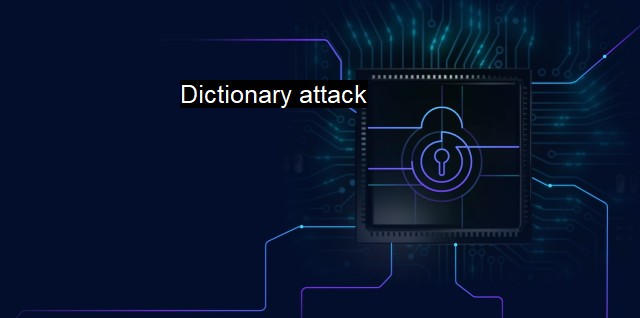What is Dictionary attack?
The Growing Threat of Dictionary Attacks: Exploiting Weak Passwords and Failing Security Protocols in Cybersecurity
A Dictionary attack is a prevalent type of cybersecurity issue connected directly to how we protect our digital identities through passwords. As an average Internet user likely knows, passwords are the first line of defense in shielding our digital lives from malicious intent. Diverse, complex combinations of words and characters arguably provide the most essential protection to our data. it’s not just the strength of the password that matters. The methods attackers use to bypass your password security are equally important to understand. Among such strategies, dictionary attacks pose considerable challenges.A Dictionary attack is a method of breaking into a password-protected computer network or data system by systematically entering every word in a dictionary as a password. These attacks are incredibly methodical, utilizing its predefined list of many possible passwords–typically compiled from a dictionary of words or a collection of commonly used passwords–to crack a specific password.
It should be noted that a dictionary attack doesn't involve the use of an actual linguistic dictionary. Instead, the dictionary in context refers to a hacker's wordlist or collection of common passwords. These wordlists can range from compilations of frequently used passwords to a broad list of words from multiple languages. The basic goal is to eventually crack the password by automating the process of entering variations of words until the right one is found.
Due to its nature, a dictionary attack can be a time-consuming process, as it could take thousands or even millions of tries before succeeding. as computing power has rapidly increased, so has the speed and feasibility of successful dictionary attacks. Techniques such as rainbow table dictionary attacks, where hashes of common passwords are precomputed and stored for fast look-up, have further expedited this process.
Dictionary attacks can crack passwords involving common words or phrases but struggle against random or complex ones. A password that may have been considered secure a few years ago—such as password123—might now be broken in very little time through a dictionary attack.
It's crucial to understand the existence of these attacks, given how they shed light on appropriate password security measures. Proper antivirus and cybersecurity measures have a great deal to do with preventing such attacks. Whereas an ordinary antivirus may not guard against dictionary attacks directly, it does offer underlying security features like regularly updating, fortifying systems from malware, and removing potential back doors that might give away your password.
Instances of two-factor authentication (2FA) and Captchas introduced as standard practice by a number of online platforms are worth mentioning here. As these outreach strategies add an additional security layer for the password, captivating potential attackers, they serve to restrict dictionary attack attempts significantly.
Meanwhile, improvements to password policies aim to mitigate the success rate of dictionary attacks. They encourage the use of non-dictionary strings and complex combinations of alphanumeric and special character passwords to maximize password security. This increases the number of potential combinations a dictionary attack would need to run through, thereby making the task dauntingly hefty and time-consuming.
Regardless of the measures in place, awareness of possible attacks is fundamental to securing digital assets. This means acknowledging that dictionary attacks can and do happen. As they are a relatively low-tech method of hacking, their prevalence continues. Consequently, the refinement and updating of cybersecurity practices, such as safe storage of passwords and use of secure networks, are highly necessary to ensure we're diligently conserving good password hygiene—our utmost shield against dictionary attacks.

Dictionary attack FAQs
What is a dictionary attack in cybersecurity?
A dictionary attack is a type of cyber attack where an automated program attempts to guess a password or encryption key by systematically trying every word in a dictionary.How does antivirus software protect against dictionary attacks?
Antivirus software can detect and block dictionary attacks by identifying patterns of repeated login attempts or suspicious activity. It can also prompt users to create stronger passwords and enable two-factor authentication to prevent unauthorized access.What are some effective countermeasures against dictionary attacks?
Some effective countermeasures against dictionary attacks include using complex and unique passwords, limiting login attempts, implementing password lockout policies, and regularly updating software and security protocols.Can dictionary attacks be successful even with strong passwords?
Yes, dictionary attacks can still be successful even with strong passwords if the attacker has a large enough dictionary or is using a customized list of targeted words. It is therefore important to use additional layers of security, such as multi-factor authentication or biometric verification, to prevent unauthorized access.| | A | | | B | | | C | | | D | | | E | | | F | | | G | | | H | | | I | | | J | | | K | | | L | | | M | |
| | N | | | O | | | P | | | Q | | | R | | | S | | | T | | | U | | | V | | | W | | | X | | | Y | | | Z | |
| | 1 | | | 2 | | | 3 | | | 4 | | | 7 | | | 8 | | |||||||